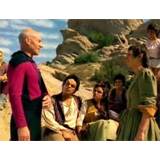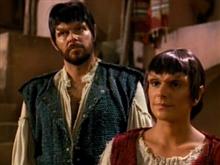 If this list were a countdown instead of a chronological one, this episode would almost certainly hold first place. A dramatic, smart, and moving exploration of what happens when the Prime Directive is inadvertently broken, “Who Watches the Watchers?” is also among the most explicitly theological installment of any Star Trek, taking its place with such adventures as the original series’ “Who Mourns for Adonais?” as an overt challenge to religious faith. I wonder if this episode’s interrogative title intentionally mirrors the other. As with “Adonais,” the “god” in “Watchers” turns out to be an advanced alien who depends upon the kind of incredibly advanced technology Arthur C. Clarke said would be indistinguishable from magic. This time, however, that advanced alien is one of us!
If this list were a countdown instead of a chronological one, this episode would almost certainly hold first place. A dramatic, smart, and moving exploration of what happens when the Prime Directive is inadvertently broken, “Who Watches the Watchers?” is also among the most explicitly theological installment of any Star Trek, taking its place with such adventures as the original series’ “Who Mourns for Adonais?” as an overt challenge to religious faith. I wonder if this episode’s interrogative title intentionally mirrors the other. As with “Adonais,” the “god” in “Watchers” turns out to be an advanced alien who depends upon the kind of incredibly advanced technology Arthur C. Clarke said would be indistinguishable from magic. This time, however, that advanced alien is one of us!
Watch this key scene from the episode. (Use the non-English subtitles if you like.)
No doubt, this is one of the most gripping sequences of TNG’s early years. But, from this sci-fi Christian’s perspective, it is also one of the most theologically disappointing.
Picard’s discomfort with Nuria’s reverence of him as “the Overseer” is, in itself, well-placed. It reminds me of the angel’s reaction to John the seer in Revelation: “I fell down at his feet to worship him, but he said to me, ‘You must not do that! I am a fellow servant with you and your comrades who hold the testimony of Jesus. Worship God!’” (19.10; cf. 22.8-9). Picard, however, urges Nuria to place her faith, not in any god, but in herself, teaching her that the Mintakans will, with time, make the same kind of wonderful advancements humanity has made.
Again, to a point, this exhortation is theologically justifiable. There’s no doubt God created humans in such a way that we are capable of amazing things. As the psalm-singer marveled, we are “fearfully and wonderfully made” (Ps. 139.14). But then Christian faith speaks this critical qualification: Having been fashioned in the image of God (Gen. 1.27), even having been placed “a little lower than God” and “crowned with glory and honor” (Ps. 8.5), isn’t the same as being God.
Granted, Picard does acknowledge humanity’s limitations in this episode (still smarting, perhaps, from the events of “Q Who”): “For all our knowledge, all our advances, we are just as mortal as you are. We’re just as powerless to prevent the inevitable.” But is death the only answer to the question the episode’s title raises? Are “the watchers”—Starfleet and Federation personnel—“watched” only by mortality? Star Trek assumes an advanced and enlightened humanity can and will hold itself morally accountable. Picard’s suggestion, early in the action, that Dr. Crusher should have left an injured Mintakan to die rather than beam him up to the Enterprise sickbay is a brief but chilling piece of evidence to the contrary. When we try to put ourselves in the heights that belong to God alone, we only set ourselves up to fall.
“Who Watches the Watchers?” crystallizes all of Star Trek‘s standard operating assumptions about religion. Bottom line: it can never be good. As you heard in the scene immediately above, it must, by Trek‘s logic, inevitably deteriorate into Inquisitions and Crusades. Leaving religion behind is, Picard states in no uncertain terms, an “achievement.”
I suppose, at this point, as an ordained minister, let alone and more importantly as a Christian struggling to be faithful to Jesus, I should roundly criticize the franchise for its secular humanist orientation. I’ve done of a bit of that in this post already!
The trick, of course, is that the critics of faith–of religion in general, and of Christianity in particular–have a point. Bad things, terrible things, horrible things have been done and are even now being done in the name of God. I’ll never forget sitting in a church history class in seminary, reading sermons from my own forebears in the Presbyterian tradition, preachers in the antebellum South arguing (so they claimed) from Scripture that slavery was entirely justified and must not only be continued but defended as ordained of God.
 The incognito Counselor Troi’s question near the end of that second clip is one we Christians must never stop asking ourselves–What if we’re wrong?–because God knows, literally, we have been, and with devastating results.
The incognito Counselor Troi’s question near the end of that second clip is one we Christians must never stop asking ourselves–What if we’re wrong?–because God knows, literally, we have been, and with devastating results.
But another question echoes in our ears, or ought to: “Lord, to whom can we go? You have the words of eternal life” (John 6.68). With apologies to Shakespeare, the fault, dear Christians, is not in our Savior, but in ourselves.
I appreciate this prayer for the Church, from the Episcopal Book of Common Prayer:
Gracious Father, we pray for your holy Catholic Church. Fill it With all truth, in all peace. Where it is corrupt, purify it; where it it in error, direct it; where in anything it is amiss, reform it. Where it is right, strengthen it; where it is in want, provide for it; where it is divided, reunite it; for the sake of him who died and rose again, and ever lives to make intercession for us, Jesus Christ, thy Son, our Lord.
You see, we pray for the Church, not to it. Our ultimate faith is not, cannot be, in the institutional Church, in “religion” as Star Trek defines it. The Church, religion, will always let us down, in some way, to some degree. But the One to whom the Church, at her best, faithfully points, the One to whom she belongs, will never disappoint or lead us astray.
All Scripture quotations from the New Revised Standard Version.
Next Time: Join us (not to mention the Goddess of Empathy) on the Holodeck, won’t you? “Hollow Pursuits” await…

Another excellent article, Michael!
For me, the very presence of the question, “Who?” indicates a direction for the journey. Many have wondered what the universe is for, if we’re alone in it, how it was made, etc. Star Trek dances around these questions usually, and occasionally issues disappointing answers (like in this episode). But the fact that the question WHO even occurs to us gives every human a major head-start to his life-long journey of asking all the other questions.
This episode is even titled, “WHO watches the watchers.” Not What Watches, or How Do They Watch… But WHO. Why would that ever occur to a human to ask unless there is a personal figure behind it all?
I always appreciate your reading and commenting, Mickey – thanks! I hadn’t ever thought about the title in just that way – it does seem to suggest (I would argue, contrary to the episode itself) that *someone* needs to be watching the watchers (in this case, the UFP/Starfleet – probably no accident that the Mintakans dub Picard “the Overseer”).
You’re right, it is a human impulse to reach out to someone *beyond.* I am put in mind of Spock’s line from ST:TMP: “Each of us turns at some point to someone – a father, a brother, a god – and asks, ‘Is this all that I am? Is there nothing more?'” Confirming, I guess, Augustine’s conviction that our hearts are created for God, and remain restless unless we rest in him.
And I also realized there is one occasion where religion is seen positively: “Bread and Circuses,” from TOS. Or at least 892-IV’s parallel development to Earth history is seen as a god… surprising that Kirk and co. forgot the Inquisition and Crusades on that occasion!
Um, I should’ve said, “seen as a good,” not as a god!
You’re also forgetting the classic treatise on religion that is Star Trek V: The Final Frontier.
Say what will be said about the execution, as a Trek story it stands firmly in the original series tradition and it dares to “go there”, from “I need my pain” to “what does God need with a spaceship” to “maybe God’s right here” . . .
Kirk is an agnostic, not an atheist. By the time Next Generation rolls around, though, it seems people finally “got it right” by Picard’s standards.
This the first moment in science fiction where I knew that not only was I, as a Christian, being criticized, but I also felt the need to respond to the criticism — not out loud or with a letter to the studio or any such thing, but personally. When religion was criticized in the original series, it was removed slightly. It felt not like a criticism of my belief in God, but as a criticism in people who used belief in God for the wrong purposes — or an indictment of organized religion that has lost its way, so to speak.
When it happened here, it was clearly an indictment or even judgement against religion in general and believers. The clear implication is that those who still feel the need to have the crutch of religion are “un-evolved.” Whatever your beliefs on evolution, Picard just took a dig at you if you believe in God.
My primary problem with this: for such an open minded guy, and a guy who has conversed with people who could easily be called gods . . . in the context of his character, he’s not open to the possibility?
I thought, as Star Trek tells us, “There are always possibilities.”
The central conceit, though, is a great concept. The reference to “inquisitions”, “holy wars”, and the like in the second Youtube clip you have there comes from a rational thought: these people, without guidance, will turn their re-found belief in the “Overseer” into those horrible things.
“Without guidance.”
I think that’s a reasonable statement. The horrible things that have been done in the name of God and Christianity come when followers of God go outside the guidance that has been given them.
Finally, Gene Roddenberry’s own thoughts on religion: “For most people, religion is nothing more than a substitute for a malfunctioning brain.” “Who Watches” follows that example.
Unfortunately, often in TNG when two sides of an argument are made, and one of those sides is Picard’s . . . the other side is unreasonable at best, and just plain wrong.